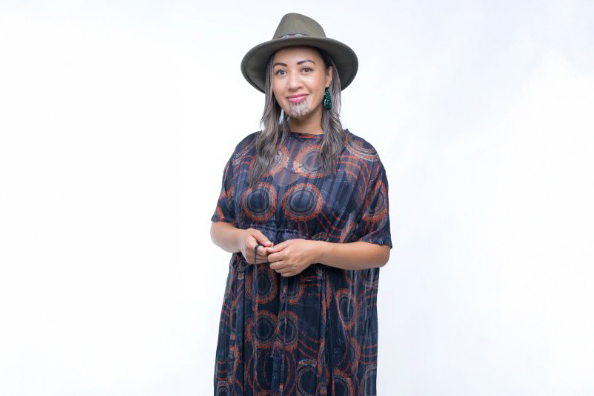While Tangimoe Clay continues to highlight the benefits of flax as a renewable resource, she says weaving is not just about fibre.
As the inaugural winner of the Whakatāne Society of Arts and Crafts Local Art Award, Tangimoe's entry was an installation of five kete demonstrating practicality, resourcefulness and mastery.
But even with more than 20 years of rāranga knowledge, the Whakatōhea artist decided to enrol with Te Wānanga o Aotearoa into the Bachelor of Māori Visual Arts - Maunga Kura Toi in 2014 for the opportunity to connect with other skilled practitioners.
Tangimoe says the programme gave her the time and space to dig deep into the ceremony of tangihanga - including the study of the coffin and the meaning of her name.
"Tangimoe means cry my sleep, or to mourn and I've always been fascinated by death," she says.
"So it's the weaving together of a lot of things. I chose to do the degree to well and truly establish myself more in the realm of tūturu Māori."
For her studies she delved into the process of building burial caskets from waka huia to taking part in modern day coffin clubs, where people get together to build their own coffins. Her research also led her from memories of sitting as a girl on whaariki around tupāpaku to discussions with her own kuia about breaking new ground as a female coffin maker.
To reciprocate a long-standing weaving relationship with a kuia, Tangimoe agreed to build a casket for her husband, who had been given three months to live.
"I felt so fortunate that I was able to talk with them right through the entire process," says Tangimoe.
Initially the kuia planned to weave the casket, but as the koroua had worked in the bush, he wanted it made from wood. She was then able to get the takitahi weave painted on the exterior with the help of artist friend Tanya Leef.
"Once it was finished I took the vessel to my place because the koroua was not ready yet. When he passed I took the coffin to the undertakers and received the honour from his kuia to help dress him and take him back to his marae," she says.
"Over my time at Te Wānanga o Aotearoa, these things unfolded and it's all the people that are weaved together at this time of grief."
Tangimoe's kaiako Ngarongoa Lentfer says although this kaupapa was one of the more unusual, it is common for tauira to explore old customs.
"With Tangimoe being an experienced weaver, she was able to investigate deeper links not only into her name but also into her craft. We often see traditional practices being reclaimed by tauira here and as always, it’s a privilege to facilitate that growth."




































